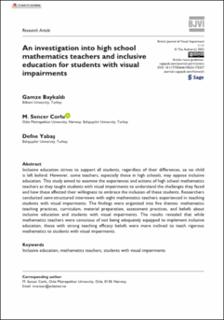An investigation into high school mathematics teachers and inclusive education for students with visual impairments
Peer reviewed, Journal article
Published version
Permanent lenke
https://hdl.handle.net/11250/3072001Utgivelsesdato
2023Metadata
Vis full innførselSamlinger
Originalversjon
https://doi.org/10.1177/02646196231175327Sammendrag
Inclusive education strives to support all students, regardless of their differences, so no child is left behind. However, some teachers, especially those in high schools, may oppose inclusive education. This study aimed to examine the experiences and actions of high school mathematics teachers as they taught students with visual impairments to understand the challenges they faced and how these affected their willingness to embrace the inclusion of these students. Researchers conducted semi-structured interviews with eight mathematics teachers experienced in teaching students with visual impairments. The findings were organized into five themes: mathematics teaching practices, curriculum, material preparation, assessment practices, and beliefs about inclusive education and students with visual impairments. The results revealed that while mathematics teachers were conscious of not being adequately equipped to implement inclusive education, those with strong teaching efficacy beliefs were more inclined to teach rigorous mathematics to students with visual impairments.

